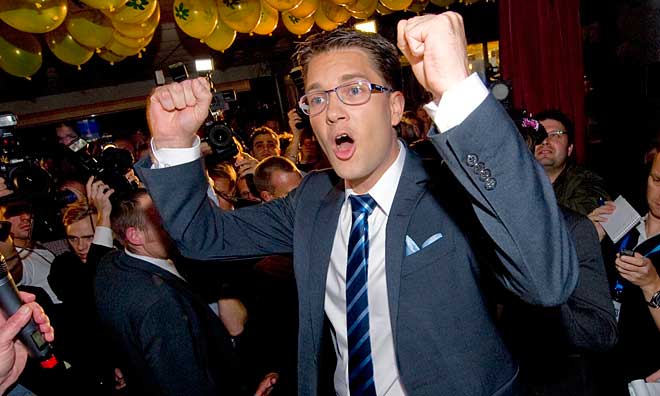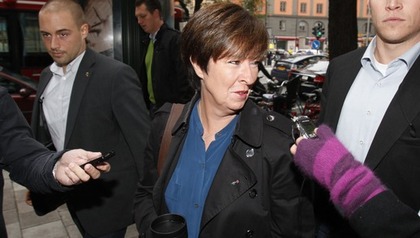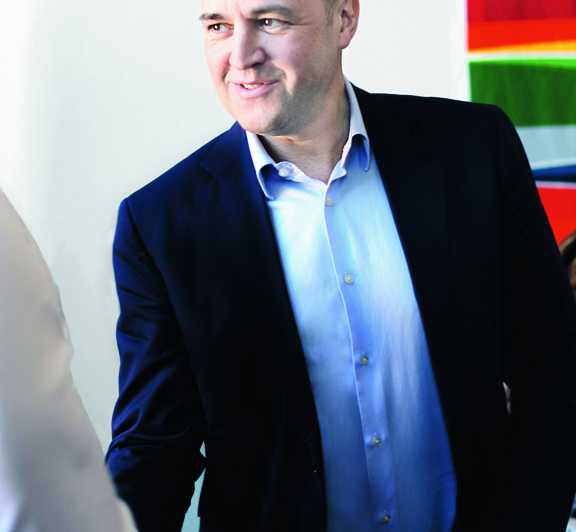Swedish media on the election result: 'The end of an era'
Going green or right..? Governing Prime Minister Reinfeldt has reason for concern with a win without overall majority | The election in numbers | Who the Sweden Democrats (SD) are and what they want | Who is Jimmie Åkesson, chairman of SD?
-
 Election in Sweden 2010 - "The end of an era," writes Aftonbladet, as the historically dominant Social Democrats were clobbered. Above Jimmie Åkesson, leader of the Sweden Democrats, the election's real winners, people are protesting against Sweden Democrats, and a somber-looking Prime Minister Fredrik Reinfeldt, whose win wasn't as sweet this time.
Election in Sweden 2010 - "The end of an era," writes Aftonbladet, as the historically dominant Social Democrats were clobbered. Above Jimmie Åkesson, leader of the Sweden Democrats, the election's real winners, people are protesting against Sweden Democrats, and a somber-looking Prime Minister Fredrik Reinfeldt, whose win wasn't as sweet this time. -
-
Good night election, good morning chaos! The left leaning tabloid Aftonbladet perhaps says it best today, on the day after the Swedish election: "the nightmare scenario is a fact." With Sweden's far-right winning seats in parliament for the first time in history, denying the outgoing center-right alliance an overall majority, and the historically dominant Social Democrats clobbered, Swedish media on Monday saw the end of an era in the country's politics. Exclaimed Dagens Nyheter in an editorial titled “The end of an era”: "The (center-right) Alliance's victory marks the end of the Social Democrats' long dominance of Swedish politics. The election's unpleasant back side is the (far-right) Sweden Democrats' advance.”
-
 Sweden Democrat leader Jimmie Åkesson on the night of the election: "We're writing history tonight!"
Sweden Democrat leader Jimmie Åkesson on the night of the election: "We're writing history tonight!" -
-
The Svenska Dagbladet newspaper meanwhile said it was time for Swedes to "draw up a new national image" on Monday morning as it hammered out the three central changes to Sweden's political landscape, "a center-right government without a majority, a crashed social democracy and a kingmaker party with roots in the far-right". The paper also noted that in the absence of a majority in parliament - the exiting coalition obtained 172 seats in the 349 seat parliament - "(Prime Minister) Fredrik Reinfeldt ... now has to invite in the Green Party to talks in order to build a government that is able to act". It predicted a "shaky ride ahead for the election's winner".
Swedish media seemed just as concerned with the complicated parliament ahead as with the historical defeat of the Social Democrats, which have dominated politics for most of the century. Recalling that the Social Democrats had been in power "for 83 % of the time since 1932", Dagens Nyheter said "the time when one party was subscribed to power and could decide of everything is gladly over". With Mona Sahlin as their leader, this election marked the Social Democrats' worst score since 1914 and "the party will never again feel like it owns Sweden", Göteborgs-Posten said. "In other countries, its obviously not strange for a center-right government to be re-elected, but this is Sweden, it's a never before seen phenomenon," said Svenska Dagbladet. The paper noted that with no party sharing the Sweden Democrats' anti-immigrant views, Sweden has also been an exception. Tabloid Expressen meanwhile deplored that "obscure forces have taken Swedish politics hostage", calling on Reinfeldt to immediately find an agreement with the Greens, to whom the outgoing Prime Minister reached out late Sunday. And Aftonbladet added: "Fredrik Reinfeldt is thinking of staying with his government, and it will probably be under the influence of the far-right.” -
 "We had a bad election," said Social Democratic leader Mona Sahlin in what was the understatement of the day. This election marked the Social Democrats' worst score since 1914
"We had a bad election," said Social Democratic leader Mona Sahlin in what was the understatement of the day. This election marked the Social Democrats' worst score since 1914 -
The election in numbers
So far the votes at the Swedish election went like this, as reported through SVT ( http://valresultat.svt.se/10099.html )
Christian Democrats (KD): 5.6%
Center Party (C): 6.6%
Liberal Party (FP): 7.1%
Moderate Party (M): 30.0%
The Alliance: 49.3%
Left Party (V): 5.6%
Green Party (MP): 7.2%
Social Democratic Party (S): 30.8%
Red-Greens: 43.6%
Sweden Democrats (SD): 5.7% -
 "Fredrik Reinfeldt is thinking of staying with his government, and it will probably be under the influence of the far-right,” claimed left leaning Aftonbladet in its commentary. Everything does indicate the governing Alliance have to commence work with either SD or the greens... Photo: Johan Jeppson
"Fredrik Reinfeldt is thinking of staying with his government, and it will probably be under the influence of the far-right,” claimed left leaning Aftonbladet in its commentary. Everything does indicate the governing Alliance have to commence work with either SD or the greens... Photo: Johan Jeppson -
Hindsight is always an astute observer but maybe the result from the election shouldn't be so surprising after all... and the uncertainties about what the Sweden Democrats really stand for could have been cleared away if the political and media apparatus had acknowledged their presence sooner. Nordstjernan columnist Ulf Nilson remarked on some important aspects of the election already two weeks ago: www.nordstjernan.com/news/viewpoints/2622/
-
Who the Sweden Democrats are and what they want
Sweden – long regarded as one of the world’s most tolerant countries, have for the first time put an anti-immigrant party into parliament. The Sweden Democrats' original leaders had roots in neo-Nazi movements of the late 1970’s and 80’s, but have gradually discarded these more radical elements since its founding in 1988. One of the Party’s most important goals is to have much lower levels of immigration and a return to what it sees as a policy of assimilation, rather than integration, saying Sweden has taken in too many immigrants over too short a time, and that only a few of them are in real need of shelter. SD has criticized Islam and Muslims as being un-Swedish. They want tougher citizenship requirements and backs tougher punishment for crime, including obligatory expulsion of all foreigners who commit more serious crimes. The Sweden Democrats emerged from the ultra-nationalist "Keep Sweden Swedish" movement, and leader jimmie Åkesson acknowledges it has counted neo-Nazis among its supporters. However, he insists, the party has completely changed character since then: -
"That's the old Sweden Democrats. Today we are different and voters see that," he told AFP before the election. Åkesson is however just the visible face of the Sweden Democrat leadership, said Anders Hellström, a political scientist specializing in Scandinavian neo-nationalist movements. The true party leadership consists of a "gang of four", made up of Åkesson along with Richard Jomshof, Björn Söder and Mattias Karlsson, who are all "leading the ideological development of the Sweden Democrats from extremism to populism," he told AFP. While the party is trying to distance itself from its extremist past, it is not afraid to be provocative, Hellström said. "One could say that they try to push the limits of what is legitimate speech, balancing on the fringe of what’s acceptable," he said. The Sweden Democrats’ discourse has however until now been relatively stifled by the mainstream media and political establishment's refusal to interact with them and a lack of legislation in Sweden regulating how much airtime each political party gets. On Afghanistan: SD wants to bring home all Swedish troops no later than 2013. Instead of investing internationally, they want to boost the Swedish military and reinstate the draft, along with a three-month long education for all Swedes. On Hemspråksundervisning: SD wants the so-called “hemspråksundervisning”, education for children of foreigners in their native tongue, to be avskaffad and to be replaced with education in Swedish dialects. On Age of criminal responsibility: SD wants the age of criminal responsibility to be legally lowered from 15 to 12 years. A twelve-year old who commits a crime, should be punishable with an electric monitoring device placed on the foot.
-
Who is Jimmie Åkesson?
The leader of the Sweden Democratic Party Jimmie Åkesson, a 31-year old man who lives in Sölvesborg, has already spent five years at the helm of the far-right Sweden Democrats and is credited with a populist makeover that made it possible for the party to be voted into parliament Sunday. A member of the Sweden Democrats since the age of 15, Åkesson has helped catapult the party from its status as an obscure movement with a neo-Nazi past and virtually no voter support, to a more polished populist group. In 1998, the party won just 0.37% of votes, then 1.44% in 2002, before surging to 2.93 in 2006, under Åkesson’s direction. It took around 4.6 % in Sunday's vote, according to exit polls, passing the 4% barrier for entering parliament and landing in the position of kingmaker, since neither the major right or leftwing political bloc secured a majority. Far from the muscular, towering Viking look-alikes typical of the most extremist far-right movements, Åkesson, with his slight build, lightly gelled dark hair and schoolboy glasses, has helped radically change Swedes' perception of the party. Before becoming a full-time politician, Åkesson studied political science at Lund University. -
-
